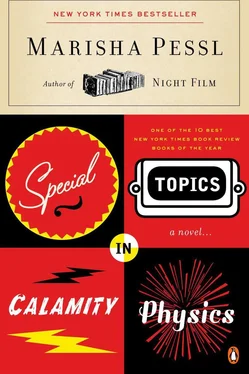Jade’s words slammed into my head: “She’s really the worst actress on the planet. If she was an actress, she wouldn’t even make the B movies. She’d be in the D or the E movies.”
“Anyway,” Hannah went on, “who cares about any of that now — the reasons for things. Don’t think about it. Ten years from now— that’s when you decide. After you’ve taken the world by storm. Are you sleepy?” She asked this quickly and evidently had no interest in my answer because she yawned into her fist, stood up, and stretched in the lazy royal way of her own white Persian cat — Lana or Turner, I wasn’t sure which — who, with a heralding thrash of tail, strolled out of the darkness beneath the piano bench and meowed.
The Sleeping Beauty and Other Fairy Tales
Icouldn’t sleep.
Oh, no — now that I was alone in a strange, stiff bed, a pale morning soaking through the curtains, the overhead lamp a giant eye staring down at me, The Histories of the Bluebloods began to creep out of the underbrush like exotic nocturnal animals at nightfall (see “Zorilla,” “Shrew,” “Jerboa,” “Kinkajou” and “Small-Eared Zorro,” Encyclopedia of Living Things , 4th ed.). I had very little experience dealing with Dark Pasts, apart from close readings of Jane Eyre (Brontë, 1847) and Rebecca (Du Maurier, 1938) and though I’d always secretly seen splendor in melancholic chills, ashy circles stamped under the eyes, wasted silence, now, knowing each of them had suffered (if Hannah could be believed), it worried me.
After all, there was Wilson Gnut, the calmly handsome kid I knew at Luton Middle in Luton, Texas, whose father hanged himself on Christmas Eve. Wilson’s own ensuing tragedy had nothing to do with his father, but in the way he was treated at school. People weren’t mean to him — quite the contrary, they were sweet as pie. They held open doors, offered homework to plagiarize, allowed him to cut in line at all water fountains, vending machines and gym uniform distributions. But lurking within their benevolence was the universal understanding that because of his father, a Secret Door had been opened for Wilson, and anything and everything dark and deviant could fly out of it — suicide, sure, but other frightening things too, like Necrophilia, Polyorphantia, Menazoranghia, maybe even Zootosis.
With the quiet precision of Jane Goodall alone at her observation post in a tropical forest of Tanzania, I observed and documented the array of looks elicited in Wilson’s presence by students, parents and faculty alike. There was the Relieved Glance of “Darn Glad I Ain’t You” (after smiling amiably at Wilson, performed covertly to a commiserating third party), the Sorry Look of “He’ll Never Git Over It” (performed to the floor and/or immediate space around Wilson), the Meaningful Gaze of “Kid’ll End Up Crooked as a Dog’s Hind Leg” (performed deep into Wilson’s brown eyes) and the Simple Gawk of the Unbelieving (mouth open, eyes unfocused, overall demeanor near vegetative, performed at Wilson Gnut’s back as he sat quietly at his desk).
There were gestures too, like the Just-Whistlin’-Dixie Wave (performed after school in car windows as students drove away with their parents and noticed Wilson still waiting for his mother, who had stringy hair and a goat laugh and wore beads, a gesture always accompanied by one of three remarks: “So sad, what happened,” “Cain’t imagine what he’s goin’ through” or the bluntly paranoid, “Dad’s not goin’ kill himself anytime soon. Is he?”). There was also the That’s-Him-Thar Point, the That’s-Him-Thar Point in the Opposite Direction of Wilson Gnut (a Texan’s attempt at subtlety) and worst of all, the Quick Conniption (performed by students when Wilson Gnut’s hands accidentally touched theirs, on door handles, for example, or passing Unit Tests around class, as if Wilson Gnut’s misfortune was an illness transmitted via hands, elbows or fingertips).
In the end — and this was the tragedy — Wilson Gnut ended up agreeing with everyone. He, too, began to believe a Secret Door had been opened just for him and awaited something dark and deviant, which, any moment now, would come flying out. It wasn’t his fault, of course; if the world insinuates you’re a Dog That Don’t Hunt, a Cowboy With No Shit Kickers, In Low Cotton, you tend to believe it’s true. Wilson stopped spearheading basketball games at break, disappeared from Olympics of the Mind. And even though, on multiple occasions, I overheard a few well-meaning kids asking him if he wanted to accompany them after school to KFC, Wilson avoided eye contact, mumbled, “No, thanks,” and disappeared down the hall.
I thus concluded, with the same awe of Jane Goodall discovering the chimpanzees’ nimble use of tools to extract termites, it really wasn’t so much the tragic event itself, but others having knowledge of it that prevented recovery. Individuals could live through almost anything (see Das unglaubliche Leben der Wolfgang Becker , Becker, 1953). Even Dad was in awe of the human body and Dad was never in awe of anything. “It really is staggering, what the corpus can withstand.”
After this observation, if he was in a Bourbon Mood and feeling theatrical, Dad did Brando as Colonel Kurtz.
“‘You have to have men who are moral,’” droned Dad, slowly turning his head toward me, widening his eyes in an attempt to portray Genius and Insanity simultaneously, “‘and at the same time, able to use their primordial instincts to kill without feeling, without passion, without judgment…’” (Dad always raised his eyebrows and stared at me pointedly on “judgment.”) “‘Because it’s judgment that defeats us.’”
Of course, I had to question the soundness of what Hannah had told me, of Hannah herself. There had been an undeniable sound-staginess to her words, evidence of fake palms (vagueness over exact locations), a prop warehouse (wineglass, endless cigarettes), wind machines (tendency to romanticize), publicity stills (heavy gazes at the ceiling, the floor) — theatrical flairs that brought to mind the lovelorn posters caking her classroom. It was also true, plenty of confidence men were capable of spinning grim fairy tales under pressure, replete with backstory, artful cross-reference, dashes of irony and twists of fate without a single flick of the eyes. And yet, while such villainous scheming was remotely plausible, it didn’t exactly seem feasible for Hannah Schneider. Sharpies and shortchangers concocted such elaborate fictions to escape the slammer; what was Hannah’s motivation for making up forlorn pasts for each of the Bluebloods, brutally pushing them outside, locking the door, making them stand in the rain? No, I felt certain there was a basic truth to what she’d told me, even if it had Hannified studio lighting and white people in pancake makeup playing savages.
With these thoughts, morning sneaking toward the windows, flimsy curtains whispering to a draft, I fell asleep.
There’s nothing like a bright and chipper morning to briskly send running all demons of the night before. (Contrary to popular belief, Unease, Inner Demons and Guilt Complexes were remarkably unsure of themselves and usually fled in the strong presence of Ease and Squeaky-Clean Conscience.)
I woke up in Hannah’s tiny guest room — walls the color of bluebells — and slumped out of bed. I pulled back the thin white curtain. The front lawn shivered excitedly. Blue sky ballooned overhead. Crisp brown leaves, en pointe, were busy practicing glissades and grand jêtés down the driveway. On Hannah’s moldy bird feeder (usually as forsaken as a house with asbestos insulation and lead paint) two fat cardinals lunched with a chickadee.
Читать дальше












